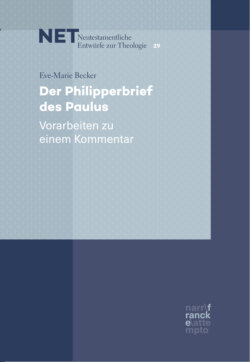Читать книгу Der Philipperbrief des Paulus - Eve-Marie Becker - Страница 16
На сайте Литреса книга снята с продажи.
II Philip MelanchthonMelanchthon, Philip(p)’s reading of Paul’s letter to the Philippians and contemporary exegesis* 1. The quest
ОглавлениеSince the 1960/70s, widely initiated by Krister Stendahl’s (1921-2008) deconstruction of the “introspective Self,”Melanchthon, Philip(p)1 the so-called “New PerspectiveNew Perspective on Paul” (NPP) has formulated a strong critique on a Pauline exegesis dominated by Lutheran hermeneutics.2 By Lutheran hermeneutics we generally mean a specific Lutheran readingLutheran reading by which certain theologoumena of reformatory theology are taken as an interpretative frame for reading Paul’s letters and understanding Pauline anthropological thinking.Selbst, self, selfhood3
With its strong focus on terms like πίστις, νόμος, and δικαιοσύνη, Paul’s letter to the Romans was and still is the focus of NPP- and “Radical New PerspectiveRadical New PerspectiveNew Perspective” (RNP)-debates.4 Paul’s letter to the Philippians, by contrast, never really was in the frontline of these discussions. However, when it comes to the interpretation of Paul’s autobiographical narrative in Phil 3:4bff., the question about how to analyze the genitive Χριστοῦ in 3:9 (… διὰ πίστεως Χριστοῦ) – whether it is an objective or a subjective genitiveHolloway, Paul A.5 – in fact reflects some hermeneutical issues implied in the (Lutheran) justification-concept as uncovered by the NPP.
In many ways, Paul’s letter to the Philippians is an interesting test case for the study of reformatory exegesis: The topics of “law,” “faith” and “circumcision” appear most prominently in Phil 3. Likewise, Paul’s polemics against those who practice “mutilation” (3:2) is of constant interest for studying Philippians in light of the NPP or RNP.6 So far, however, the role of Paul’s letter to the Philippians for reformatory theology has not been studied systematically.7 This applies despite the fact that reformatory exegesis has – based on Pauline exegesis – produced fresh ideas about Paul and his life course as the discussion about the interpretation of Phil 4:3 most impressively shows.Clemensstrom3.448BWeiß, Bernhard071 Kor07071 Kor07,88
In this contribution, I shall provide some observations on Philip MelanchthonMelanchthon, Philip(p)’s approach to Philippians. Beside a rather “Lutheran”-inspired reference to Philippians in his Loci Communes (see 2.), Melanchthon shows multiple hermeneutical interests when reading and interpreting Paul’s letter to the Philippians. Melanchthon’s multi-faceted interest in Philippians becomes evident especially in his “Oratio in funere reverendi viri D. Martini Lutheri” from 1546 (see 3.).
